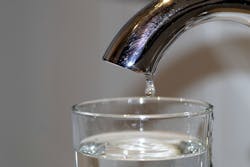Flint to Replace Lead Pipes Under Settlement
A federal judge approved a settlement that will require the State of Michigan and City of Flint, Mich., to replace the city’s lead pipes within three years, and it will be enforceable by the court.
“This hard-fought victory means safer water for Flint. For the first time, there will be an enforceable commitment to get the lead pipes out of the ground. The people of Flint are owed at least this much,” said Dimple Chaudhary, senior attorney with the Natural Resources Defense Council (NRDC) and lead counsel in the case Concerned Pastors for Social Action v. Khouri.
The agreement requires the State of Michigan to provide nearly $100 million to the city for replacement of Flint’s lead service lines. The agreement also requires the state to maintain a door-to-door water filter installation and education program, to extensively monitor Flint’s tap water for lead, and to continue to make bottled water available to Flint residents.
“Concerned Pastors brought this lawsuit to heal the damage to the community from both the lead in our water and government indifference, and to take a stand for what is right for the people of Flint. The water issue must be resolved before we can make Flint thrive again, and I believe this resolution offers a path to a healthier, less traumatic future for everyone in Flint,” said Pastor Allen Overton of the Concerned Pastors for Social Action.
Melissa Mays, a plaintiff in the case and one of the parents who confirmed Flint’s water was contaminated with lead through independent testing, said “This is a win for the people of Flint. When the government fails to uphold democracy, and protect our rights to clean water, we have to stand up and fight. The greatest lesson I’ve learned from Flint’s water crisis is that change only happens when you get up and make your voice heard.”
“We are thrilled that after nearly three years of grappling with lead-poisoned water, the residents of Flint can finally look forward to a long-term solution to a catastrophe that has devastated the community,” said Michael J. Steinberg, Legal Director of the ACLU of Michigan. “The Flint Water Crisis has its roots in the state’s toxic emergency manager law and is a tragic example of what happens when state government displaces democracy to save a few bucks. This ground-breaking settlement marks a huge step toward restoring a long-neglected community to some semblance of normalcy.”
The terms of the agreement require:
- The State to provide $97 million to the City of Flint for replacement of lead and galvanized steel pipes at no cost to Flint residents;
- The City to conduct the pipe replacements within three years;
- The State to expand and maintain its program for filter installation and education, including by conducting door-to-door visits to residents’ homes through December 2018;
- The State to fund a pair of extensive tap water monitoring programs, beyond what is legally required under federal law, to test hundreds of homes in Flint;
- The State to guarantee bottled water availability at distribution centers until at least Sept. 1, 2017 and delivery through the 2-1-1 helpline to homebound residents until at least July 1, 2017;
- The State to guarantee funding for seven existing health and medical programs designed to mitigate the effects of lead exposure for Flint residents; and
- The Court will retain authority to enforce the agreement and to ensure that the State and City meet their deadlines and fulfil their obligations.
Plaintiffs in the case Concerned Pastors for Social Action v. Khouri are Concerned Pastors for Social Action, Flint-resident Melissa Mays, the Natural Resources Defense Council, and the ACLU of Michigan. The plaintiffs will monitor implementation of the agreement and make available information related to the status of lead pipe removal and water quality reports at www.nrdc.org/Flint.
The summary of the settlement is available at www.nrdc.org/sites/wwd/files/flint-lead-pipe-replacement-agreement-summary.pdf. Visit www.nrdc.org/flint for information related to the status of lead pipe removal and water quality reports.
Source: Natural Resources Defense Council
